week12数据词典1
- 格式:ppt
- 大小:856.00 KB
- 文档页数:17
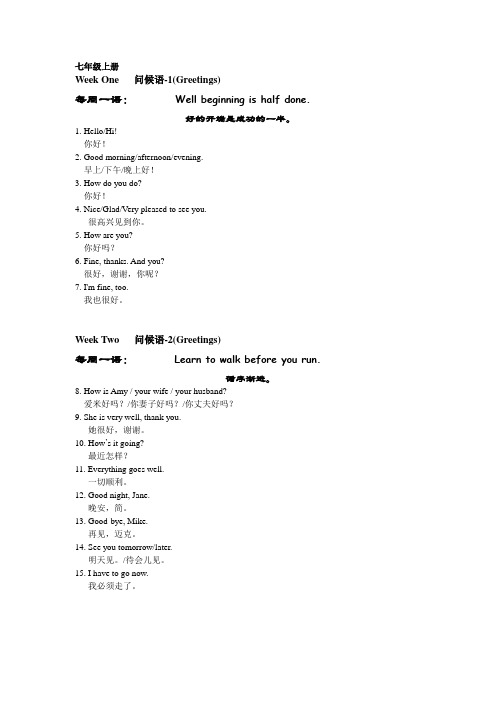
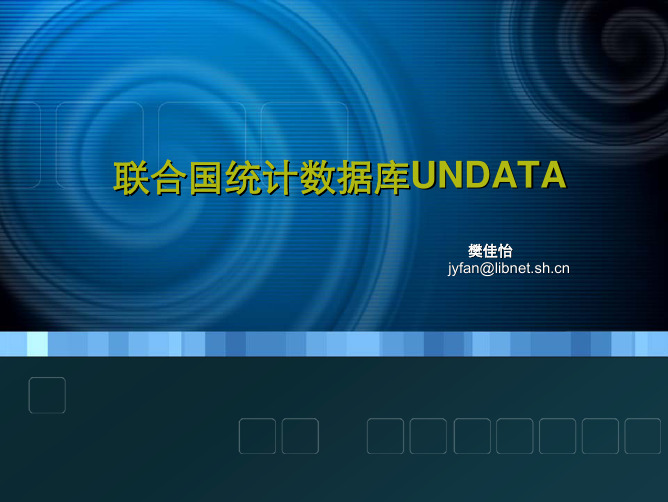

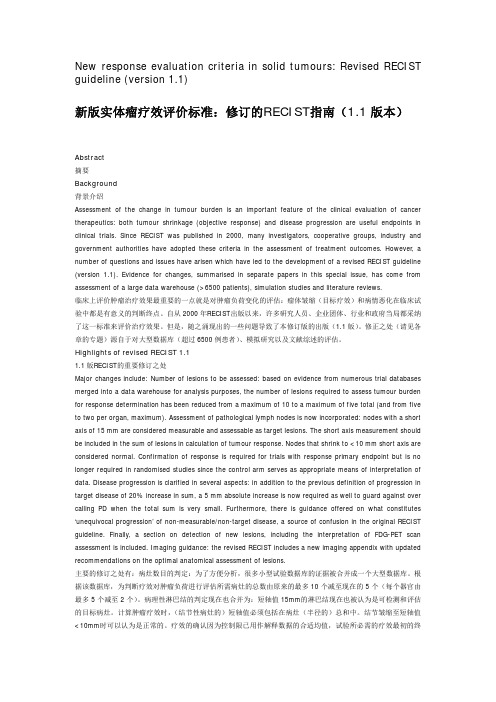
New response evaluation criteria in solid tumours: Revised RECIST guideline (version 1.1)新版实体瘤疗效评价标准:修订的RECIST指南(1.1版本)Abstract摘要Background背景介绍Assessment of the change in tumour burden is an important feature of the clinical evaluation of cancer therapeutics: both tumour shrinkage (objective response) and disease progression are useful endpoints in clinical trials. Since RECIST was published in 2000, many investigators, cooperative groups, industry and government authorities have adopted these criteria in the assessment of treatment outcomes. However, a number of questions and issues have arisen which have led to the development of a revised RECIST guideline (version 1.1). Evidence for changes, summarised in separate papers in this special issue, has come from assessment of a large data warehouse (>6500 patients), simulation studies and literature reviews.临床上评价肿瘤治疗效果最重要的一点就是对肿瘤负荷变化的评估:瘤体皱缩(目标疗效)和病情恶化在临床试验中都是有意义的判断终点。
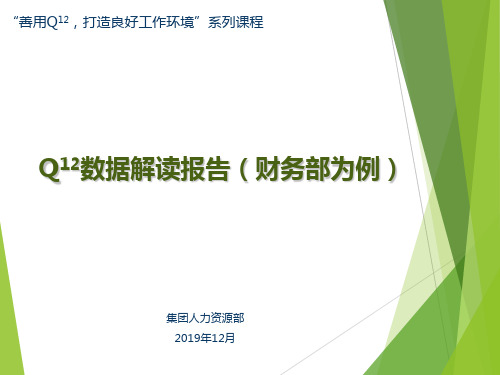
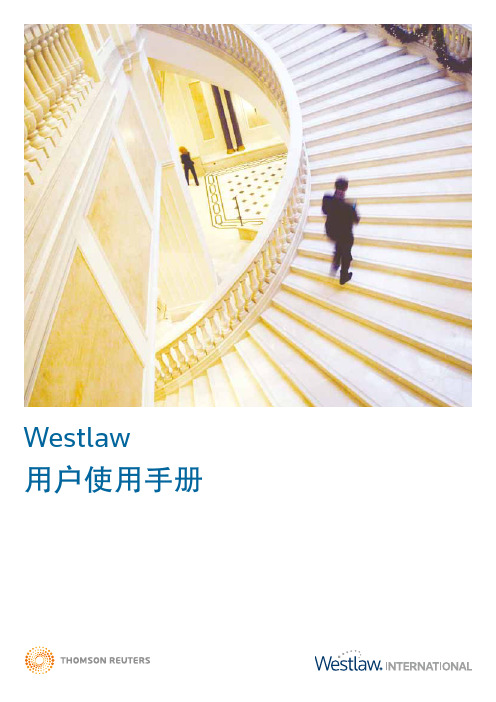
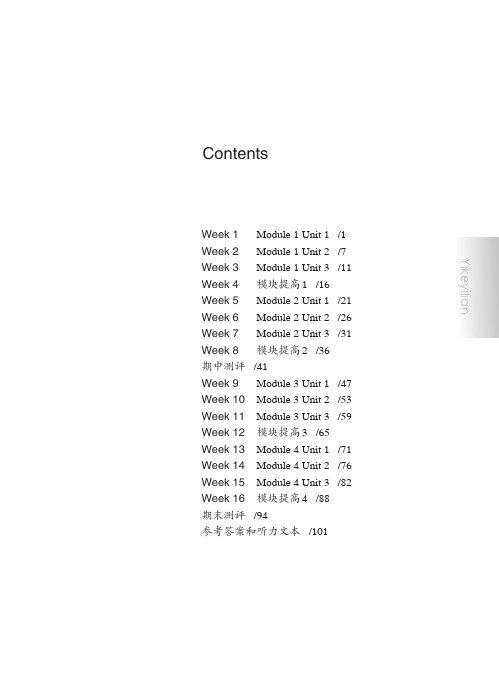
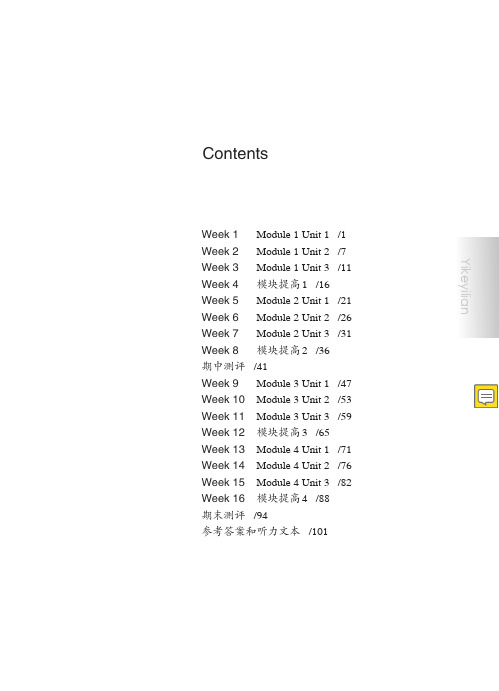
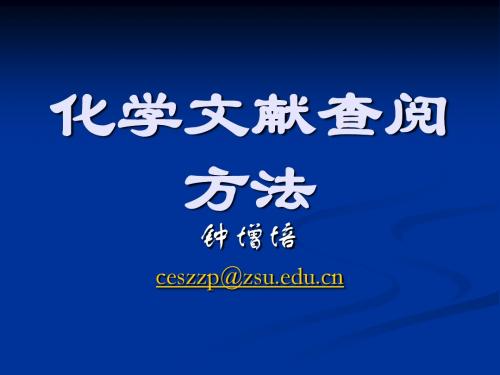
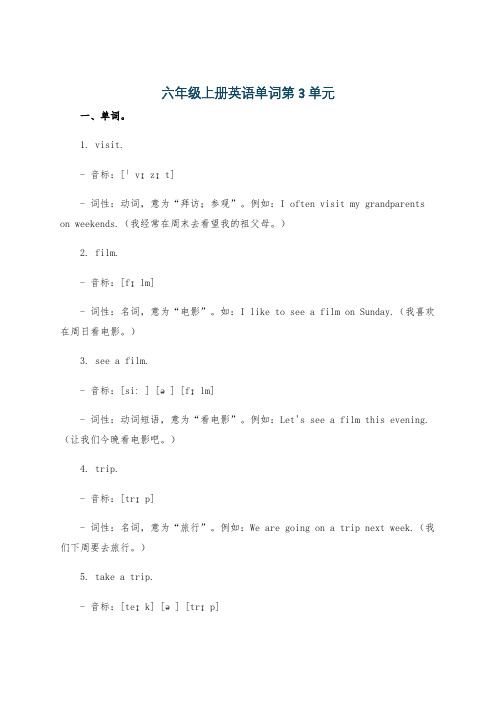
六年级上册英语单词第3单元一、单词。
1. visit.- 音标:[ˈvɪzɪt]- 词性:动词,意为“拜访;参观”。
例如:I often visit my grandparents on weekends.(我经常在周末去看望我的祖父母。
)2. film.- 音标:[fɪlm]- 词性:名词,意为“电影”。
如:I like to see a film on Sunday.(我喜欢在周日看电影。
)3. see a film.- 音标:[siː] [ə] [fɪlm]- 词性:动词短语,意为“看电影”。
例如:Let's see a film this evening.(让我们今晚看电影吧。
)4. trip.- 音标:[trɪp]- 词性:名词,意为“旅行”。
例如:We are going on a trip next week.(我们下周要去旅行。
)5. take a trip.- 音标:[teɪk] [ə] [trɪp]- 词性:动词短语,意为“去旅行”。
如:My family will take a trip to Beijing.(我的家人将去北京旅行。
)6. supermarket.- 音标:[ˈsuːpəmɑːkɪt]- 词性:名词,意为“超市”。
例如:My mother often goes to the supermarket on Saturday.(我妈妈经常在周六去超市。
)7. evening.- 音标:[ˈiːvnɪŋ]- 词性:名词,意为“晚上;傍晚”。
如:We often watch TV in the evening.(我们经常在晚上看电视。
)8. tonight.- 音标:[təˈnaɪt]- 词性:名词,意为“今晚”。
例如:We will have a party tonight.(我们今晚将举办一个聚会。
)9. tomorrow.- 音标:[təˈmɒrəʊ]- 词性:名词,意为“明天”。

可编辑修改精选全文完整版六年级上册英语第三单元测试试题一、汉译英。
1.去旅行:.2.阅读杂志.3.去看电影.4.今天上午.5.今天下午.6.今天晚上.7.今晚.8.下个星期.9.明信片.10.字典;词典11.报纸.12.你打算在周末做什么?.13.这个周末我打算去看望我的爷爷奶奶。
.14.我将有一个忙碌的周末。
.15.那将会很有趣。
.16.今天下午你打算去哪里?.17.我打算去书店。
.18.你打算买什么? .19.我打算买一本漫画书。
.20.你打算什么时候去?.二、单项选择。
()1.---are you going to do on Sunday?---I am going to clean my room.A.WhrerB.WhatC.How() 2.I’m going to the bookstore my friend this afternoon.A.andB.ofC.with() 3.She ia going to buy some. A.book B.books C.a book()4.What we going to do?A.areB.doC.is()5.I’m going to a new computer.A.havingB.haveC.has()6.---What Mike want to be in the future?---He wants to a soldier.A.do,beB.does,beC.does,is ()7.Let see.A.meB.IC.my()8.She is going to buy some magazines cooking.A.aboutB.inC.for()9.I want to be a writer day! A.a B.one C.the()10.Fish can’t live water.A.withB.noC.without()11.---Are you going to the supermarket? ---Yes,.A.they areB.he isC.we are()12.Does he watch TV the evening? A.in B.on C.at()13.---are you going this afternoon? ---I’m going to the nature park.A.WhatB.WhenC.Where()14.What are you going to do20 years’time?A.afterB.inC.at()15.We going to visit my grandparents?A.areB.isC.am三、按要求写单词。
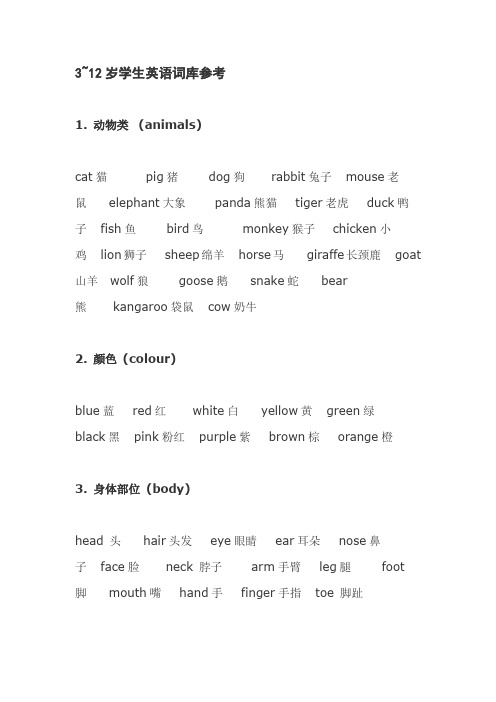
3~12岁学生英语词库参考1. 动物类(animals)cat猫pig猪dog狗rabbit兔子mouse老鼠elephant大象panda熊猫tiger老虎duck鸭子fish鱼bird鸟monkey猴子chicken小鸡lion狮子sheep绵羊horse马giraffe长颈鹿goat 山羊wolf狼goose鹅snake蛇bear熊kangaroo袋鼠cow奶牛2. 颜色(colour)blue蓝red红white白yellow黄green绿black黑pink粉红purple紫brown棕orange橙3. 身体部位(body)head 头hair头发eye眼睛ear耳朵nose鼻子face脸neck 脖子arm手臂leg腿foot脚mouth嘴hand手finger手指toe 脚趾4. 数字(numbers)one一two二three三four四five五six六seven七eight八nine九ten 十eleven十一twelve十二thirteen十三fourteen十四fifteen 十五sixteen十六seventeen十七eighteen十八nineteen十九twenty二十twenty-one二十一thirty三十forty四十fifty五十sixty六十seventy七十eighty八十ninety九十one hundred一百first 第一second第二third第三forth第四fifth第五sixth第六seventh第七eighth第八ninth第九tenth第十5. 时间日期(time)year年season四季week周 A.M. (a.m.) morning上午P.M. (p.m.) afternoon下午day日spring春天summer夏天fall秋天winter冬天yesterday昨天tomorrow 明天Monday星期一Tuesday星期二Wednesday星期三Thursday星期四Friday星期五Saturday星期六Sunday星期天weekend周末Jan.(January) 一月Feb. (February) 二月Mar. (March) 三月Apr. (April) 四月May五月June六月July七月Aug. (August) 八月Sept. (September) 九月Oct. (October) 十月Nov. (November) 十一月Dec. (December) 十二月6. 天气和温度(weather)cold冷的cool凉爽的warm温暖的hot热sunny 晴朗的cloudy多云的windy有风的rainy下雨的snowy 下雪7. 交通工具car小汽车bus公共汽车bike自行车plane飞机train 火车ship轮船subway地铁taxi出租车jeep吉普车motor摩托车boat小船on foot步行8. 食物饮料三餐味道水果breakfast早餐lunch午饭supper晚饭dinner晚饭,正餐meals三餐(food)rice 米饭noodles面条egg蛋cake蛋糕bread面包tofu豆腐hot dog热狗hamburger汉堡包noodles面条soup汤chicken鸡肉meat肉pork猪肉mutton羊肉eggplant 茄子beef牛肉vegetable蔬菜fish鱼potato 土豆green beans 青豆tomato 西红(drink)coffee咖啡tea茶water水juice果汁Coke可乐ice-cream冰激凌ice冰milk牛奶(fruit)orange桔子apple苹果pear梨strawberry草莓banana香蕉grapes葡萄lemon柠檬peach桃子watermelon西瓜9.职业(jobs)doctor医生driver司机singer歌手farmer农民nurse 护士teacher教师student学生writer作家actor男演员actress女演员cleaner清洁工engineer工程师TV report 电视台记者artist 画家policeman 警察accountant 会计salesperson销售员player运动员10. 反义词big---small大的/小的long ---short长的/短的tall--- short高的/矮的thin--- fat瘦的/胖的heavy---light重的/轻的happy--- sad高兴的/悲伤的open---close打开/关上good--- bad好的/坏的new---old新的/旧的old ---young年长的/年青的cold ---hot冷的/热的far---near 近的/远的right---left右边/左边east---west东面/西面south---north南面/北面go---come 来/去up---down 上/下here---there这里/那里11. 衣服(clothes)T-shirt T恤衫shirt衬衫skirt短裙shoes鞋子dress 连衣裙hat帽子jacket 夹克衫socks袜子sweater毛线衣coat外套boots靴子jeans牛仔裤shorts短裤pants长裤slippers拖鞋sandals凉鞋vest背心sneakers运动鞋12.地方(place)home家room房间bedroom卧室bathroom卫生间kitchen厨房living room客厅study书房school 学校classroom教室gym体育馆playground操场canteen餐厅park公园art room美术室farm农场library图书馆teacher’s office老师办室computer room计算机教室music room音乐教室post office邮局hospital医院cinema电影院bookstore书店nature park自然公园zoo动物园bank银行garden花园pet shop宠物店supermarket超市museum博物馆shop 商店13. 代词I 我you你he他she她it它we我们you 你们they 他(她、它)们my我的your 你的his 他的her她的its它的our我们的your你们的their他(她、它)们的14.方位及方位介词south南north北east东west西left左边right右边in在…里on在…上under在…下面near在…旁边behind在…后边next to与…相邻over在…上面in front of在…前面15.心情及患病happy高兴的sad伤心的bored无聊的angry生气的excited兴奋的tired疲劳的sick有病的hurt疼痛have a fever发烧have a cold感冒have a toothache牙疼have a headache头疼have a sore throat喉咙疼16.自然景物sky天空sun太阳cloud云wind风rain雨star星星moon月亮air空气rainbow彩虹river河流lake湖泊stream小溪sea大海bridge 桥forest森林path小道road公路mountain山building建筑物city城市village乡村17.疑问词what什么what day星期几what color什么颜色what time 什么时间why为什么who 谁where哪里which one哪一个when什么时候which哪一个how多么,怎样how old几岁how many多少how tall 多高how much多少钱how heavy多重18. 国家语言及首都China中国Chinese中国的,中国人的,汉语Beijing 北京England英国English英语,英国的,英国人London伦敦the USA美国America 美国的,美国人New York纽约Japan日本Canada 加拿大Austrian澳大利亚19.植物(plant)tree树flower花grass草seed种子sprout苗leaf叶子20. 动词词组swim游泳fly飞jump跳walk走run跑sleep睡觉drink water喝水get up起床go to bed起床go home回家go to school去上学go swimming去游泳go fishing去钓鱼go shopping买东西go hiking去远足go skiing滑雪go skating滑旱冰go ice-skating滑冰play sports做运动play ping-pong打乒乓play football踢足球play the piano弹钢琴play chess 下棋play computer games玩电脑游戏play the violin拉小提琴listen to music听音乐watch TV看电视read a book看书write a letter写信write an e-mail写邮件write a report写报告take pictures拍照片sing and dance唱歌跳舞draw pictures 画画fly kites 放风筝watch insects观察昆虫make kites 做风筝pick up leaves摘树叶do an experiment做实验catch butterflies抓蝴蝶count insects数昆虫collect stamps收集邮票have a picnic野餐do homework做家庭作业eat breakfast吃早餐do morning exercises晨练have English class上英语课plant trees种树visit grandparents看望爷爷奶奶make a snowman堆雪人ride a bike骑车climb a mountain爬山row a boat 划船take a trip 旅游do housework做家务clean the room打扫房间cook dinner做晚饭make the bed铺床wash clothes洗衣服do the dishes洗碗sweep the floor扫地set the table摆饭桌answer the phone接电话water the flowers浇花empty the trash倒垃圾21.文具、家具等物品bag书包pen钢笔pencil铅笔ruler尺子eraser橡皮book书pencil-case铅笔盒bed床light灯sofa 沙发chair椅子desk课桌table桌子wall墙TV电视door门window窗户floor地板board写字板glass玻璃杯fan风扇mirror镜子curtain窗帘trash bin垃圾箱closet衣柜phone电话box盒子shelf书架fridge冰箱computer电脑,计算机teacher’s desk讲台sharpener卷笔刀notebook笔记本dictionary词典comic book漫画书post card明信片newspaper报纸story-book故事书picture图片,照片22. 性别及家庭成员boy 男孩girl女孩Mrs 女士Mr.先生Miss小姐mother母亲mum妈妈(口语)father 父亲dad爸爸(口语)parents 父母grandmother祖母grandma奶奶(口语)grandfather祖父grandpa爷爷(口语)uncle叔叔aunt 阿姨sister姐妹brother兄、弟son儿子baby婴儿friend朋友23. 动词过去式规则变化:play---played wash---washed watch---watched climb---climbed visit---visitedlisten---listened dance---danced learn---learned row---rowed cook---cooked clean---cleaned不规则变化:go---went do---did take---took sing---sang see---saw fly---flew eat---atehave---had swim---swam buy---bought read---read 24.形容词比较级long---longer shorter---shorter young---younger tall---t aller old---older strong---stronger small---smallerthin---thinner big---bigger sad---sadder hot---hotter heavy---heavier funny---funnier happy---happiernice---nicer fine---finer large---larger一般现在时:A: When do you go to school? B: I usually go to school at 7:00.A: How do you go to school? B: I go to school on foot.A: What do you do on the weekend? B: I often play ping-pong. Sometimes I go hiking.现在进行时:(ing)A: Hello! B: Hi, John. This is Mike. What are you doing?A: I’m doing homework. What about you?B: I’m listening to music. What is your father doing?A: He’s reading newspapers.一般过去时:A: Where did you go on your holiday? B: I went to Shanghai>A: How did you go there? B: I went by train.A: What did you do there? B: I went shopping.一般将来时:A: What are you going to do on your holiday? B: I’m going to Beijing.A: How are you going to there? B: I’m going by plane.A: What are you going to do? B: I’m going to the Great Wall.。
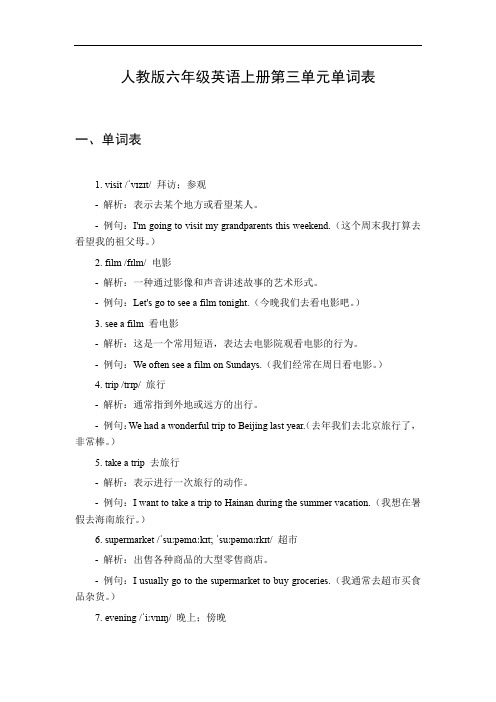
人教版六年级英语上册第三单元单词表一、单词表1. visit /ˈvɪzɪt/ 拜访;参观-解析:表示去某个地方或看望某人。
-例句:I'm going to visit my grandparents this weekend.(这个周末我打算去看望我的祖父母。
)2. film /fɪlm/ 电影-解析:一种通过影像和声音讲述故事的艺术形式。
-例句:Let's go to see a film tonight.(今晚我们去看电影吧。
)3. see a film 看电影-解析:这是一个常用短语,表达去电影院观看电影的行为。
-例句:We often see a film on Sundays.(我们经常在周日看电影。
)4. trip /trɪp/ 旅行-解析:通常指到外地或远方的出行。
-例句:We had a wonderful trip to Beijing last year.(去年我们去北京旅行了,非常棒。
)5. take a trip 去旅行-解析:表示进行一次旅行的动作。
-例句:I want to take a trip to Hainan during the summer vacation.(我想在暑假去海南旅行。
)6. supermarket /ˈsuːpəmɑːkɪt; ˈsuːpəmɑːrkɪt/ 超市-解析:出售各种商品的大型零售商店。
-例句:I usually go to the supermarket to buy groceries.(我通常去超市买食品杂货。
)7. evening /ˈiːvnɪŋ/ 晚上;傍晚-解析:指一天中日落之后到深夜之前的时间。
-例句:In the evening, I like to read books.(在晚上,我喜欢读书。
)8. tonight /təˈnaɪt/ 在今晚-解析:表示今天晚上这个时间点。
-例句:We are going to have a party tonight.(我们今晚要举办一个派对。
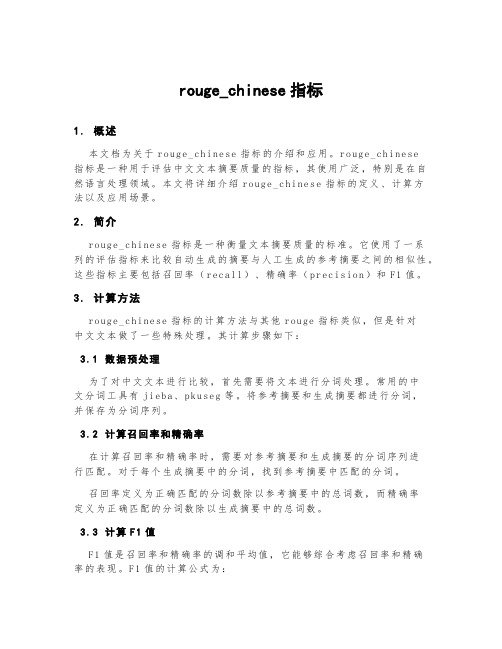
rouge_chinese指标1.概述本文档为关于ro ug e_c hi ne se指标的介绍和应用。
r ou ge_ch i ne se指标是一种用于评估中文文本摘要质量的指标,其使用广泛,特别是在自然语言处理领域。
本文将详细介绍ro ug e_c hi ne se指标的定义、计算方法以及应用场景。
2.简介r o ug e_ch in es e指标是一种衡量文本摘要质量的标准。
它使用了一系列的评估指标来比较自动生成的摘要与人工生成的参考摘要之间的相似性。
这些指标主要包括召回率(r ec al l)、精确率(pr ec is io n)和F1值。
3.计算方法r o ug e_ch in es e指标的计算方法与其他r ou ge指标类似,但是针对中文文本做了一些特殊处理。
其计算步骤如下:3.1数据预处理为了对中文文本进行比较,首先需要将文本进行分词处理。
常用的中文分词工具有ji eb a、p ku se g等。
将参考摘要和生成摘要都进行分词,并保存为分词序列。
3.2计算召回率和精确率在计算召回率和精确率时,需要对参考摘要和生成摘要的分词序列进行匹配。
对于每个生成摘要中的分词,找到参考摘要中匹配的分词。
召回率定义为正确匹配的分词数除以参考摘要中的总词数,而精确率定义为正确匹配的分词数除以生成摘要中的总词数。
3.3计算F1值F1值是召回率和精确率的调和平均值,它能够综合考虑召回率和精确率的表现。
F1值的计算公式为:2*(p re ci si on*r eca l l)/(pr ec is io n+r e ca ll)。
F1值越高,表示生成摘要的质量越好。
4.应用场景r o ug e_ch in es e指标在文本自动生成、自动摘要等领域具有广泛的应用。
以下是几个常见的应用场景:4.1文本生成评估利用ro ug e_ch in ese指标可以评估自动生成的文本质量,例如自动摘要算法生成的摘要与参考摘要的相似性。
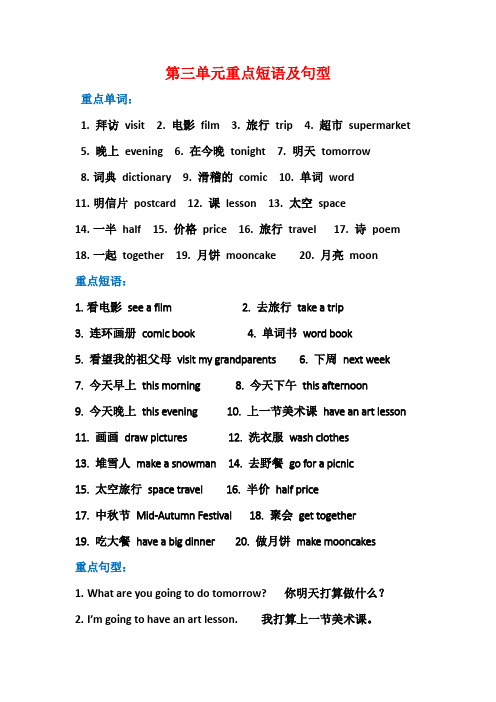
第三单元重点短语及句型重点单词:1. 拜访visit2. 电影film3. 旅行trip4. 超市supermarket5. 晚上evening6. 在今晚tonight7. 明天tomorrow8.词典dictionary 9. 滑稽的comic 10. 单词word11.明信片postcard 12. 课lesson 13. 太空space14.一半half 15. 价格price 16. 旅行travel 17. 诗poem 18.一起together 19. 月饼mooncake 20. 月亮moon重点短语:1.看电影see a film2. 去旅行take a trip3. 连环画册comic book4. 单词书word book5. 看望我的祖父母visit my grandparents6. 下周next week7. 今天早上this morning8. 今天下午this afternoon9. 今天晚上this evening 10. 上一节美术课have an art lesson 11. 画画draw pictures 12. 洗衣服wash clothes13. 堆雪人make a snowman 14. 去野餐go for a picnic15. 太空旅行space travel 16. 半价half price17. 中秋节Mid-Autumn Festival 18. 聚会get together19. 吃大餐have a big dinner 20. 做月饼make mooncakes重点句型:1.What are you going to do tomorrow? 你明天打算做什么?2.I’m going to have an art lesson. 我打算上一节美术课。
3.We’re going to draw some pictures in Renmin Park.我们打算去人民公园画画。
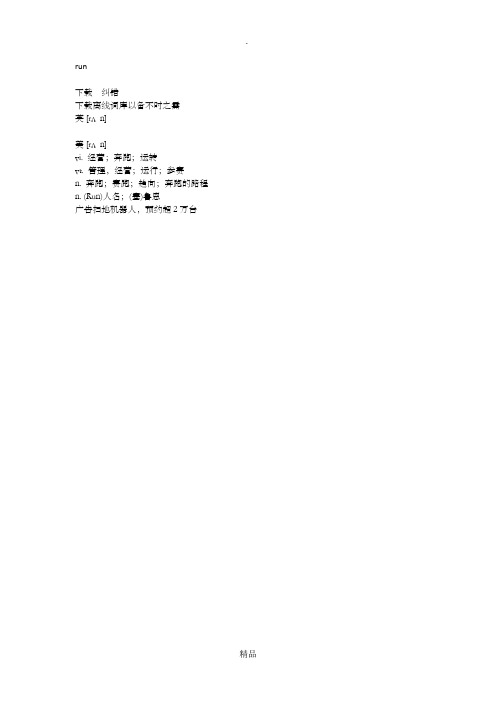
. run下载纠错下载离线词库以备不时之需英 [rʌn]美 [rʌn]vi. 经营;奔跑;运转vt. 管理,经营;运行;参赛n. 奔跑;赛跑;趋向;奔跑的路程n. (Run)人名;(塞)鲁恩广告扫地机器人,预约超2万台朗文词典柯林斯词典21世纪词典run 1/rʌn,rʌn/ v. S1 W1英 [rʌn]pt: ran pp: run pres part: runningMEANINGS 义项1.MOVE QUICKLY USING YOUR LEGS 奔跑[I] to move very quickly, by moving your legs more quickly than when you walk 跑,奔跑•The children came running out of the house. 孩子们从屋里跑出来。
•Women ran screaming , with children in their arms. 妇女们抱着孩子,一边跑一边尖叫。
•Jane struggled free and ran for her life (= ran in order to avoid being killed ) . 简挣脱出来,赶紧逃命。
•Hurry! Run for it (= run as quickly as possible in order to escape ) ! 快!快逃!•He picked up the child and ran like hell . (= ran very quickly, especially in order to escape ) 他抱起孩子,拼命奔逃。
[+ down/up/to/towards etc]•I ran down the stairs as fast as I could. 我尽可能快地跑下楼梯。
•He was running towards the door. 他正朝着门口跑去。
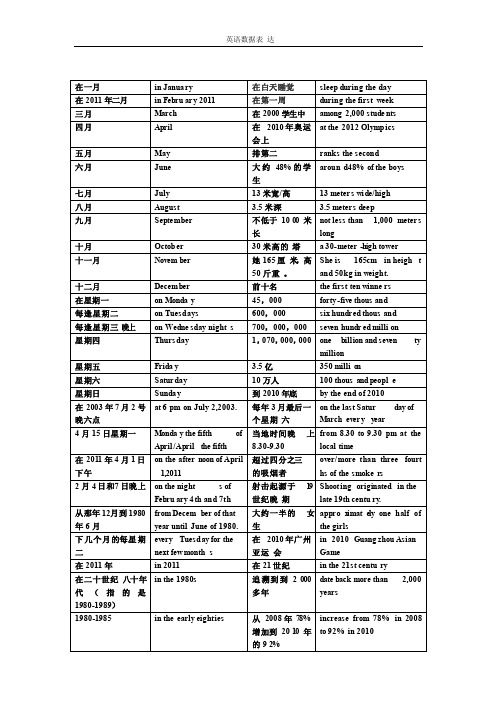
日期用定冠词the加序数词表示。
在哪一天要添加介词on如:National Day is on Oct. 1.国庆节是十月一日。
(读作October first)此句也可以表示为National Day is on the 1st of Octobe r.表示不具体、不确切的时间,如世纪、年代、年份、月份时,用介词in表示,表示具体确切的某一天用介词on表示;通常情况下m o rnin g,afternoon,evenin g等词前用介词in。
但是,当这些词前后有一修饰限定的词作为定语,把它们限定为某一天早晨、下午或晚上时,介词in应改为on。
这里的修饰限定词可以是介词短语、名词、形容词、定语从句等。
1,On a cold mornin g,the old man died lonely in his house.在一个寒冷的早晨,这个老人孤独地死在自己的房子里。
2,I don't want to be disturb ed on nights when I have to study.我不愿意在我必须学习的晚上被打扰。
3,The accident happened on the afternoon of July 7.这次事故发生在7月7日下午。
4,We are to have a small test on Monday mornin g.星期一早晨我们将进行一次小测验。
年代用定冠词及基数词表示的世纪加十位整数的复数形式构成如:in the 1930's(in the thirti es of the twenti eth century或in the ninete en thirti es)在二十世纪三十年代in the 1860's(in the sixtie s of the 19th century或in the eighte en sixtie s)在十九世纪六十年代表示某年代的早期、中期和晚期,可以在定冠词后,年代前添加 early,m id-,late如:in the early 1920's 在二十世纪二十年代早期in the mid-1950's 在二十世纪五十年代中期。
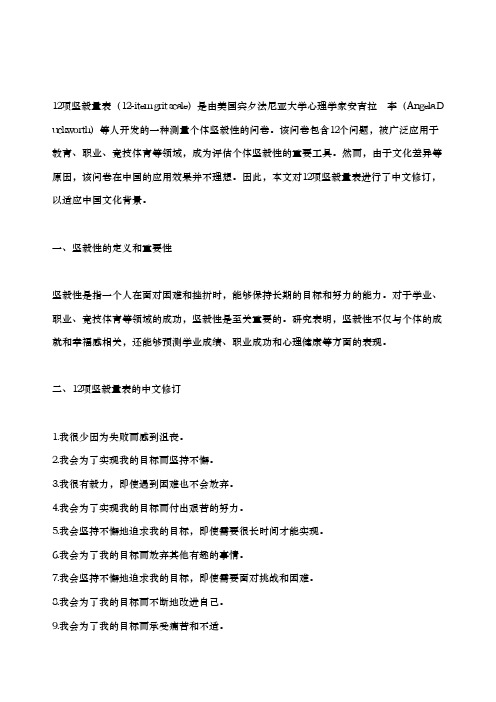
12项坚毅量表(12-item grit scale)是由美国宾夕法尼亚大学心理学家安吉拉李(Angela D uckworth)等人开发的一种测量个体坚毅性的问卷。
该问卷包含12个问题,被广泛应用于教育、职业、竞技体育等领域,成为评估个体坚毅性的重要工具。
然而,由于文化差异等原因,该问卷在中国的应用效果并不理想。
因此,本文对12项坚毅量表进行了中文修订,以适应中国文化背景。
一、坚毅性的定义和重要性坚毅性是指一个人在面对困难和挫折时,能够保持长期的目标和努力的能力。
对于学业、职业、竞技体育等领域的成功,坚毅性是至关重要的。
研究表明,坚毅性不仅与个体的成就和幸福感相关,还能够预测学业成绩、职业成功和心理健康等方面的表现。
二、12项坚毅量表的中文修订1.我很少因为失败而感到沮丧。
2.我会为了实现我的目标而坚持不懈。
3.我很有毅力,即使遇到困难也不会放弃。
4.我会为了实现我的目标而付出艰苦的努力。
5.我会坚持不懈地追求我的目标,即使需要很长时间才能实现。
6.我会为了我的目标而放弃其他有趣的事情。
7.我会坚持不懈地追求我的目标,即使需要面对挑战和困难。
8.我会为了我的目标而不断地改进自己。
9.我会为了我的目标而承受痛苦和不适。
10.我会在遇到挫折时坚持不懈地努力。
11.我会为了我的目标而付出很多时间和精力。
12.我会为了我的目标而不断地寻找新的方法和策略。
三、修订原则和方法本文的修订原则是在保留原问卷核心内容的基础上,结合中国文化背景和语言习惯,进行适当的修订和调整。
具体方法如下:1.翻译:首先进行了12项坚毅量表的中文翻译工作,确保翻译准确、简明易懂。
2.讨论:在翻译的基础上,组织专家和受访者进行讨论,收集意见和建议,确定修订方向和内容。
3.调整:根据讨论结果,对原问卷进行适当的调整和修订,以适应中国文化背景和语言习惯。
四、修订后的问卷应用实例为了验证修订后的问卷的可靠性和有效性,本文在某高校进行了一项问卷调查。